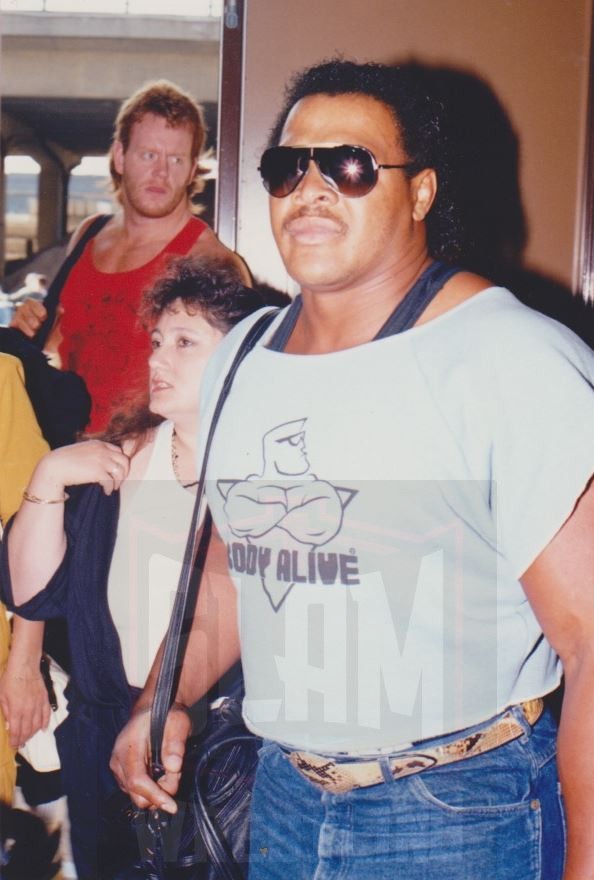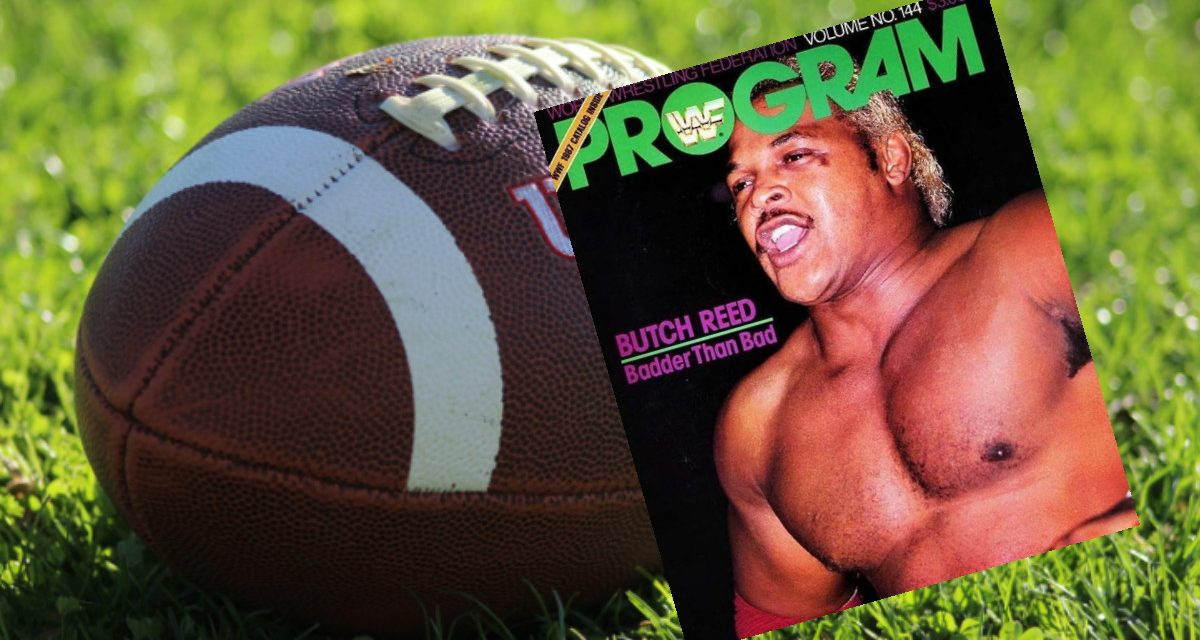This might be shocking to you but in professional wrestling facts are exaggerated. Wait, even that underplays it. Not only are stories fudged but creating myths is encouraged.
It worked great back when kayfabe existed and Archie Gouldie could be a non-speaking Mongolian Stomper in the southern United States but a raving maniac heel in Calgary’s Stampede Wrestling, his home territory.
But with so much access to instant information, the perpetuating of falsehoods runs rampant in society and in the “Internet Wrestling Community” it has gotten ridiculous.
Here is one simple example, easy to check but that no one seemed to do, except this website.
Bruce Reed, who wrestled as “Hacksaw” Butch Reed, never played in the National Football League. Every one of the obituaries that noted that “fact” — including the World Wrestling Federation’s obit on him — is wrong.
How long did it take me to sleuth out the actual facts? No more than 10 minutes but that’s obviously 10 more minutes than these so-called “journalists” want to spend. (Note that part of the complication was that there was another Bruce Reed playing football at the time, though he was a highly-sought-after high schooler and Caucasian, easy to tell when there’s a photo in the newspaper!)
The facts:
- Bruce Reed attended the University of Central Missouri, suiting up for the football team in the 1973, 1974 and 1975 seasons.
- He played what was then called a nose guard and today is just called a linebacker.
- A story from September 9, 1975 noted that “nose guard Bruce Reed returns to anchor the defense” under new Central Missouri State coach Walter Hicklin.
- Reed went unclaimed in the 1975 NFL Draft.
- The NFL’s Kansas City Chiefs announced that Reed had signed with the team on May 21, 1976.
- The Chiefs cut Reed on July 20, 1976.
- He appears in none of the all-time roster lists for the Chiefs (or the NFL for that matter).
What happened? Why was he cut? One story I dug up referenced ankle and knee issues.
Reed himself did few interviews about his life, in or out of pro wrestling, so the facts are unfortunately lost to time — and the Chiefs are a little busy today, playing in the Super Bowl and all, so I didn’t file a request with any historian the team might employ and who probably isn’t allowed near the archives, being deemed non-essential during the pandemic.

Mean Mark Callous (the future Undertaker) and Butch Reed at Toronto’s CNE Coliseum for a NWA show on June 27, 1990. Photo by Cliff Ketcheson
This kind of creative license isn’t unique to pro wrestling, of course.
Recently, my peers in the Society for International Hockey Research group were debating an obituary that noted that the deceased had suited up for the NHL’s Montreal Canadiens. It was a story likely told through the ages and the family told the funeral home that and it went into the obituary without ever being questioned. It was, of course, not true.
I’ve had that happen in pro wrestling too. A beloved family member dies and had always told of being a professional wrestler and a grandchild asks if I can dig up footage or information. It’s tough to damage a family’s impression of their loved one.
Pro hockey or pro football are well documented by both leagues and historians, other than the early years of the sports when paperwork was iffy, at best. Pro wrestling has no governing body, no central database, no one doing the factchecking, so it needs to fall upon the reporter to do the legwork every single time.
Please do not take this as any sort of slight at Bruce Reed. He was an amazing athlete, successful in shot put in high school and was apparently an accomplished sprinter too. In the ring, he excelled at what he was asked to do and pro wrestling was different in the 1980s than it is today; he was grounded power, muscle mass and destruction. Throughout his life, he loved horses and was into rodeo competitions too.
During his career, it would only have helped Butch Reed to have an association with the NFL. Post-career, what did it matter to clarify the facts? It didn’t.
To him.
To those of us who take chronicling this ridiculous world of professional wrestling seriously — and there aren’t enough of us — it matters most of all.
RELATED LINKS
- Feb. 5, 2021: ‘Hacksaw’ Butch Reed dies
- Feb. 5, 2021: Peers react to the death of ‘Hacksaw’ Butch Reed
- The Sporting Connection archives


A note of clarification. A nose guard is not the same thing as a linebacker. A nose guard is a defensive lineman who plays across from the center in a 3-4 defensive alignment (3 defensive linemen and 4 linebackers). Linebackers play a little further back from the line of scrimmage and are positioned between the defensive linemen and the defensive backs.
Thanks for this clarification but you should tell your readers that you also made this same mistake and went back to the previous article and edited it, adding clarification.
Honesty is appreciated through and through.
Thank you for your email. The initial story is what we call in the business “running copy” meaning that I was writing on the fly, not that anyone else would know that. At some point, there was a reference to his NFL days, but by the end, there was not. To me, the finished piece is what counts, but I will acknowledge you make a good point. However, in this case, it would be impossible to add clarifications to running copy, as that was all I did for a solid hour, going through my notes, crafting the story. The nature of what we do is to get the story out fast and correct. Since we launched the new site, we have tried to do clarifications when facts are amended or corrected, beyond typos. It oddly makes me feel better as the Producer to acknowledge the errors. Thanks for reading!
I’ve been reading your website since I got online in ’96 (at least I think you started around the time I got online)
Anyway, this is the best wrestling website, by far. I come here for stories that are more than headlines or click bait. I actually learn something new in every article.
I totally understand where you’re coming from with Reed’s pro (or lack there of) career. But to me, it’s really not that important. He was actually signed by them, and probably practiced on the field with the main roster until he was cut. He was a part of the organization.
If this was say, Dick Murdoch and West Texas State, yeah, then you can say ‘bullsht’. But Reed wore the uniform, albeit briefly.
I’ve seen a large number of obits for ex baseball players, listing a team like the Yankees or Giants, and you check Baseball- Reference, and they had 7 ABs or pitched in 1 game. Is that really more tangible than what Reed did? Maybe, maybe not.
This is one of those things where it doesn’t hurt the wrestling business, just like Jack Palance and his ‘reconstructed face’ didn’t hurt Hollywood, but did give him a little mystique.